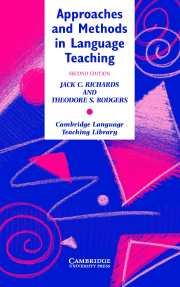Book contents
- Frontmatter
- Contents
- Preface
- Part I Major language trends in twentieth-century language teaching
- Part II Alternative approaches and methods
- Part III Current communicative approaches
- 14 Communicative Language Teaching
- 15 The Natural Approach
- 16 Cooperative Language Learning
- 17 Content-Based Instruction
- 18 Task-Based Language Teaching
- 19 The post-methods era
- Author index
- Subject index
19 - The post-methods era
Published online by Cambridge University Press: 06 July 2010
- Frontmatter
- Contents
- Preface
- Part I Major language trends in twentieth-century language teaching
- Part II Alternative approaches and methods
- Part III Current communicative approaches
- 14 Communicative Language Teaching
- 15 The Natural Approach
- 16 Cooperative Language Learning
- 17 Content-Based Instruction
- 18 Task-Based Language Teaching
- 19 The post-methods era
- Author index
- Subject index
Summary
From the survey of approaches and methods presented in this book we have seen that the history of language teaching in the last one hundred years has been characterized by a search for more effective ways of teaching second or foreign languages. The commonest solution to the “language teaching problem” was seen to lie in the adoption of a new teaching approach or method. One result of this trend was the era of so-called designer or brand-name methods, that is, packaged solutions that can be described and marketed for use anywhere in the world. Thus, the Direct Method was enthusiastically embraced in the early part of the twentieth century as an improvement over Grammar Translation. In the 1950s the Audiolingual Method was thought to provide a way forward, incorporating the latest insights from the sciences of linguistics and psychology. As the Audiolingual Method began to fade in the 1970s, particularly in the United States, a variety of guru-led methods emerged to fill the vacuum created by the discrediting of Audiolingualism, such as the Silent Way, Total Physical Response, and Suggestopedia. While these had declined substantially by the 1990s, new “breakthroughs” continue to be announced from time to time, such as Task-Based Instruction, Neurolinguistic Programming, and Multiple Intelligences, and these attract varying levels of support.
Information
- Type
- Chapter
- Information
- Approaches and Methods in Language Teaching , pp. 244 - 256Publisher: Cambridge University PressPrint publication year: 2001
Accessibility standard: Unknown
Why this information is here
This section outlines the accessibility features of this content - including support for screen readers, full keyboard navigation and high-contrast display options. This may not be relevant for you.Accessibility Information
- 2
- Cited by
